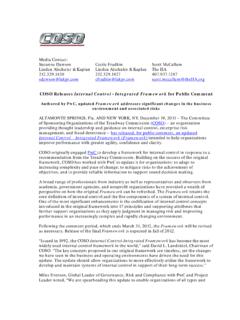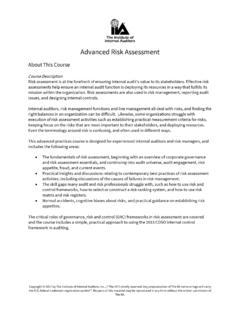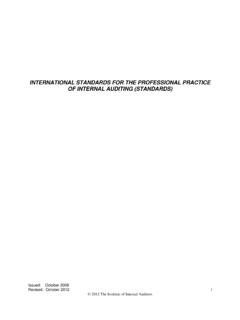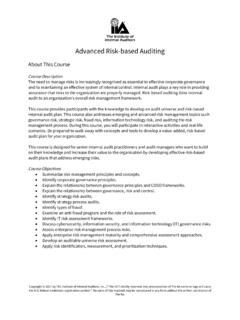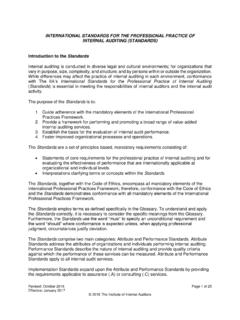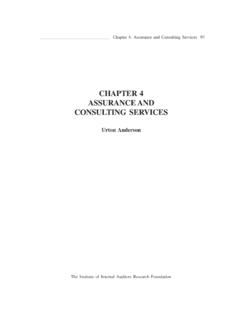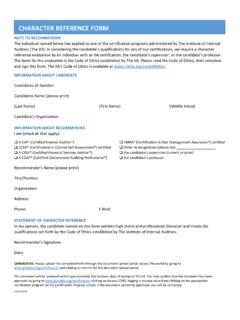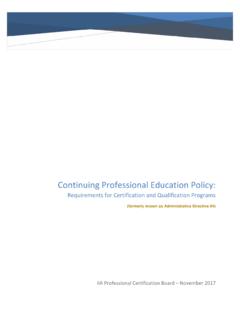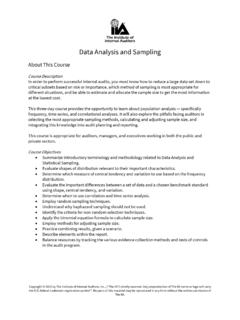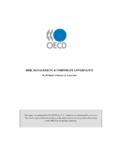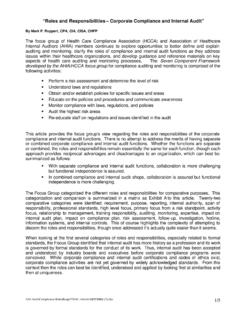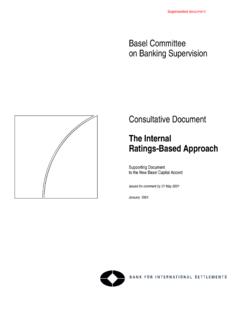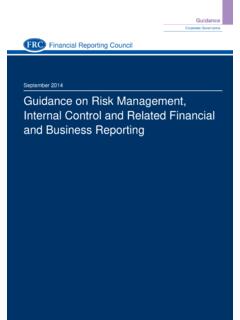Transcription of IIA INTERNAL AUDITING’S ROLE IN CORPORATE …
1 1 INTERNAL auditing S ROLE IN CORPORATE governance Introduction The word governance has become a staple of the boardroom and C-suite lexicon, but just what governance is can sometimes become muddled. At its core, governance simply is the amalgam of processes and structures designed to help the organization achieve its objectives. These processes and structures are influenced not only by risks that affect an organization s ability to achieve objectives but also by the organization s efforts to mitigate known risks and discover unknown risks. The IIA believes INTERNAL audit s role in governance is vital. INTERNAL audit provides objective assurance and insight on the effectiveness and efficiency of risk management, INTERNAL control, and governance processes.
2 INTERNAL Audit s Role INTERNAL audit provides assurance by assessing and reporting on the effectiveness of governance , risk management, and control processes designed to help the organization achieve strategic, operational, financial, and compliance objectives. It is best positioned to provide assurance when its resource level, competence, and structure are aligned with organizational strategies and when it follows IIA standards. It can do this best when it is free from undue influence. By maintaining its independence, INTERNAL audit can perform its assessments objectively, providing management and the board an informed and unbiased critique of governance processes, risk management, and INTERNAL control.
3 Based on its findings, INTERNAL audit recommends changes to improve processes and follows up on their implementation. Functioning independently within the organization, INTERNAL auditing is performed by professionals who have a deep appreciation of the importance of strong governance , an in-depth understanding of business systems and processes, and a fundamental drive to help their organizations succeed. KEY TAKEAWAYS INTERNAL audit s role in governance is vital. INTERNAL audit provides objective assurance and insight on the effectiveness and efficiency of risk management, INTERNAL control, and governance processes. INTERNAL audit insights on governance , risk, and control provoke positive change and innovation within the organization.
4 Strong management and board support of INTERNAL audit is nurtured by relationships built on mutual trust and frequent and meaningful interactions with the chief audit executive. A vibrant and agile INTERNAL audit function can be an indispensable resource supporting sound CORPORATE governance . IIA POSITION PAPER2 INTERNAL audit provides insight by acting as a catalyst for management and the board of have a deeper understanding of governance processes and structures. The IIA believes INTERNAL audit insights on governance , risk and control provoke positive change and innovation within the organization. It inspires organizational confidence and enables competent and informed decision making.
5 What s more, successful INTERNAL auditing can mature to provide foresight to the organization by identifying trends and bringing attention to emerging challenges before they become crises. INTERNAL audit can add value by providing advisory and consulting services, intended to improve governance , risk management, and control processes, so long as INTERNAL audit assumes no management responsibility. This is vital to maintaining INTERNAL audit s objectivity and avoiding conflicts of interest. Selection of the type of audits or services to be performed should be based on the audit activity s authority, maturity, and purpose, as well as the organization s needs and issues.
6 Board and Audit Committee roles The board establishes structures and processes that define governance within the organization, taking into consideration the perspectives of investors, regulators and management, among others. The board oversees and monitors the company s strategic, operational, financial and compliance risk exposures, and it collaborates with management in setting risk appetite, risk tolerances, and alignment with strategic priorities. A CORPORATE governance practice for listed companies sometimes mandated -- is to use audit committees to provide strengthened oversight of the financial and ethical integrity of publicly held companies.
7 The audit committee, made up of independent directors, can greatly strengthen the independence, integrity, and effectiveness of audit activities by providing independent oversight of the INTERNAL and external audit work plans and results, assessing audit resource and qualification needs, and mediating the auditors relationship with the organization. Audit committees also ensure that audit results are aired and any recommended improvements or corrective actions are addressed or resolved. Audit committees can serve the same function in privately held and public sector organizations. Ideally, INTERNAL audit should report functionally to the board or audit committee and administratively to management.
8 The IIA believes strong management and board support of INTERNAL audit is nurtured by relationships built on mutual trust and frequent and meaningful interactions with the chief audit executive. FIVE QUESTIONS Stakeholder understanding of INTERNAL audit s role in good governance is essential to making best use of a vital governance tool. Here are five key questions they should be asking: 1. How deeply is INTERNAL audit involved in the organization s discussions on risk? 2. Is INTERNAL audit properly positioned and resourced to provide high-quality, professional assurance and advisory services? 3. Is the head of INTERNAL audit free to develop strong relationships with the board and/or audit committee chair?
9 4. Does the board/audit committee recognize and support the best conditions under which INTERNAL audit can thrive? 5. How can management and the board support efforts to make the INTERNAL audit activity agile and innovative? 3 Conclusion INTERNAL audit strengthens CORPORATE governance through risk-based audits that provide assurance and insights on the processes and structures that drive the organization toward success. As risks grow and become more complex, INTERNAL audit s role is likely to expand in areas such as risk governance , culture and behavior, sustainability, and other nonfinancial reporting measures. As organizations address the growing array of risks created by new technology, geopolitics, cybersecurity, and disruptive innovation, a vibrant and agile INTERNAL audit function can be an indispensable resource supporting sound CORPORATE governance .
10 As risks grow and become more complex, INTERNAL audit s role is likely to expand in areas such as risk governance , culture and behavior, sustainability, and other nonfinancial measures. 4 About Position Papers The Institute of INTERNAL Auditors (IIA) promulgates Position Papers on key issues of interest to stakeholders and practitioners with the aim of advocating for sound governance and educating those involved in it. The positions outlined offer insights into various aspects of the governance process and INTERNAL audit s vital role in improving governance at all levels and adding value to the organization. Position Papers are developed and reviewed through a rigorous process that solicits input and critique from practicing INTERNAL audit professionals and other IIA volunteers who serve on The IIA s Global Advocacy Committee, IIA Standards Board, and The IIA s Professional Responsibility and Ethics Committee.
